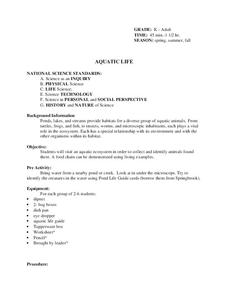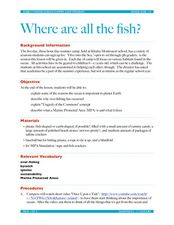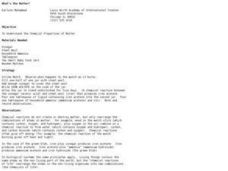Curated OER
Discovering Seeds
Young scholars compare seeds with seedlings. In this life science lesson, students make observations of seedlings and the seeds they grew from, paying special attention to the roots. Lesson includes extension activities.
Curated OER
Climbing and Crawling
Students observe and measure plant growth. In this life science lesson, students are introduced to bean and Nasturtium seedlings which they will measure and watch the beans climb (grow tall) while the Nasturtium crawl along the ground....
Curated OER
Eating Plants
Learners identify parts of a plant. In this life science lesson, student groups locate the leaves and fruits on vegetables, then find the roots. Lesson includes extension activities and background teacher information.
Curated OER
Room to Grow
Students examine radish plants and compare how they grew based on how closely the seeds were sown. In this life science lesson, students pretend to be growing plants crowded together, then examine how the radishes look based on how much...
Curated OER
Lost Ladybugs
Students study ladybugs. In this life science lesson plan, students collect ladybugs from the schoolyard and explore their characteristics. Students illustrate pictures of ladybugs.
Curated OER
Aquatic Life
Students explore aquatic life. In this science instructional activity, students visit an aquatic ecosystem and collect animals found there. Students create a food chain for the aquatic ecosystem.
Curated OER
Where Are All the Fish?
Young scholars identify the problems that marine life is facing today. In this marine science instructional activity, students explain how Marine Protected Areas can help the ocean and the fish. They brainstorm ways to help in the...
Curated OER
Are You Aware?
Bring the five senses to life with a fun science experiment! Kindergartners and first graders read an explanation of the five senses, then identify which items Sophia can sense if she is blindfolded. A science explanation at the bottom...
California Academy of Science
Coral Reef Habitat Match
Different animals live in different habitats, and each animal has specifically adaptive traits that make them tailor-made for their environments. This is true on land and in the ocean. Little ones examine how various marine animals have...
Agriculture in the Classroom
Seed Match
Using this resource, your team of green thumbs discuss why plants are a part of a healthy diet and the different ways they are used in daily life. They then observe the characteristics of different seed as they attempt to match...
Baylor College
Plant Parts You Eat
Plants provide a variety of delicious foods essential for human survival. In the fourth lesson of this series on food science, young scientists investigate common fruits, vegetables, and grains in order to determine which plant part is...
Core Knowledge Foundation
A Time for All Seasons - Spring
Celebrate the arrival of spring with this fun primary grade science unit. Engaging young scientists with a variety of hands-on activities and inquiry-based investigations, these lessons are a great way to teach children about...
Core Knowledge Foundation
A Time for All Seasons - Summer
The sun is shining and the birds are singing, what better time to teach young learners about the fun season of summer. In this week-long science series, children learn how the rotation and orbit of the earth influence...
Curated OER
Growing
Growing is part of being a living thing. Kindergartners decide which illustrations represent the life cycle of a living thing, then put a check mark next to the correct pictures. They then examine their own growth on a height chart.
Curated OER
What's the Matter? (Living and Non-Living Things)
Understand how chemical reactions recombine atoms to create the "chemicals of life". An experiment, showing the basic chemical reactions of an iron nail or a match, helps young children start their understanding of permanent changes.
ARKive
Nocturnal Animals
How do those nocturnal animals see in the dark? This perplexing question does have an answer. First, little ones use their sense of touch to determine the name of a mystery object, then they listen closely to identify various animals by...
Rainforest Alliance
How Do Jaguars and Howler Monkeys in Belize Depend on Us?
How does weather play a role in the lives of land and sea creatures? Find out with a lesson plan focused on habitats and the ways animals from different homes are connected. Here, learners explore how the life of a jaguar and...
Rainforest Alliance
Protecting the Critical Habitat of the Manatee and Loggerhead Turtle
Explore ocean habitats with a lesson that showcases the home of manatees and loggerhead turtles in Belize. Here, pupils compare and contrast the homes of ocean animals to those of humans, listen to an original short story about...
North Carolina State University
Silly Stuff
It's time to get a little silly with this fun primary grade science activity. By simply combining two liquids, white glue and corn starch, a strange solid is formed, commonly known as silly putty. To ensure everything goes smoothly,...
Curated OER
Hazards: First Grade Lesson Plans and Activities
Examine the environmental hazards associated with volcanoes with a three-part science lesson. In the pre-lab, first graders learn that gas, landslides, ash, and lava are all hazards that come from volcanoes. They then explore...
Curated OER
Pet Perspective
Discuss point of view through a familiar medium: your pet! Learners write a story from the perspective of their own or the class pet. Prompts such as "My Family" (or "My Class"), "My Day," and "A Day in the Life of a _________" help...
Curated OER
My Body
First Graders practice using the names of body parts by finding pictures and placing them in the correct position on a life-size outline of a human body. These type of hands-on lessons are one of the best ways for young learners to truly...
Curated OER
Sponge-Painted Ocean Mural
I love big mural projects. They bring a sense of ownership to the classroom, look great for parents, and can be a great way to complete a unit. Here are the steps and suggestions needed to create an ocean mural for your class. Learners...
Rainforest Alliance
Who Takes Care of the Maya Forest Corridor?
Who keeps animals safe? Who keeps us safe? Discover the helpers that make learning and growing possible through a medley of activities that focus on habitats—ours and those in the rainforest. Scholars are asked to identify one...
Other popular searches
- 4th Grade Life Science
- Life Science Inquiry
- Life Science Vertebrates
- Life Science Experiments
- K 2 Life Science
- Life Science on Cells
- Life Science Lesson Plans
- Grade 4 Life Science
- Life Science Report Topic
- Australia Life Science
- The Life Science
- Life Science Lessons























